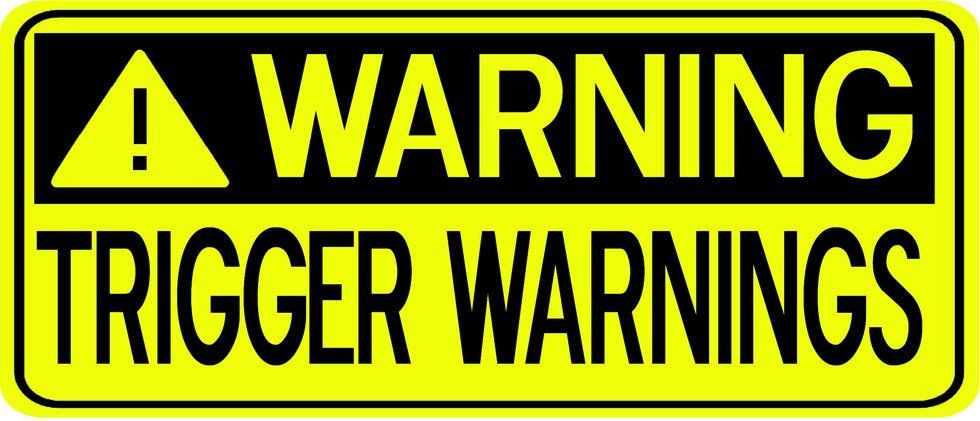TW: sexual assault, self harm
This week my English class had a discussion about the concept of trigger warnings. For those who have never encountered the concept, a trigger warning is typically a phrase posted at the beginning of a piece of media that is intended to warn the audience of specific content that may be excessively disturbing (e.g. sexual assault, abuse, incest, suicide, self harm, or military combat). A trigger warning may look something like this, posted above the Geek Feminism Wiki page on trigger warnings.
In my class, we talked about whether or not they are an extension of courtesy on behalf of a professor or if they spoil the element of surprise when consuming new media. Both of these views hold weight.
The importance of a professor taking the emotional/mental health of his/her students seriously cannot be understated. Fostering a trusting and respectful relationship between professors and students can only aid the educational process. Providing trigger warnings demonstrates that the professor views his/her students with enough complexity to care about the possibility of them having had a traumatic experience that they would rather not have to confront in the classroom.
At the same time, some people would claim that trigger warnings destroy the sought-after element of surprise in literature or film. I would agree that trigger warnings can diminish this effect. If the audience knows that there will be discussion of self harm in a book, they will be looking for it in every character. However, I would say that this diminished sense of the shock factor is a small price to pay for the emotional/mental safety of students.
I view (as I hope professors do) mental health as equal to physical health, so a trigger warning is equal to something like a "Do not ride this ride if you are pregnant or have a heart condition" warning on a roller coaster or a "This show contains strobe lights" warning for epileptics who may have seizures when encountering sensory overload. The possibility of someone having a panic attack when watching a movie containing a rape scene or starting to self harm again after seeing images of cutting is very real.
I have seen the effect that the lack of a trigger warning can cause. In a class where we were discussing Dante's Inferno, someone was called on to read a passage about something that they had a very personal connection to and was disturbed to have to read the passage aloud. The person told me later that they could barely keep from crying in class, and that they didn't remember anything that had happened the rest of the class because they were so traumatized from the content they had to read. This was a mild example of an uncomfortable experience that could have been prevented by the professor warning the class of sensitive material. I don't think anyone should ever have to be afraid to go to class or be called on because of a fear of a panic attack, and trigger warnings seem like a good way to lessen that likelihood.
Some people also complain about trigger warnings because they think that they treat students like babies by censoring any offensive content they may come into contact with, as if choosing not to confront survivors of traumatic experiences with their deepest and darkest fears is somehow preventing them from growing up and dealing with the 'real world.' I think this view stems from the belief that mental health is a trivial and/or inconsequential facet of life. The people that benefit from trigger warnings are not 'babies,' they are people attempting to take care of their mental health instead of recklessly exposing themselves to things they know will be damaging to them. I think that is extremely adult-like behavior.
In conclusion, I think trigger warnings, used sensibly, are one of the best ways a professor/student relationship can be strengthened and a deep sign of respect in everyday life. Yeah, maybe you won't jump out of your seat in the theatre during the extremely graphic scenes, but you might save someone from having to jump out of theirs for a different reason.






















